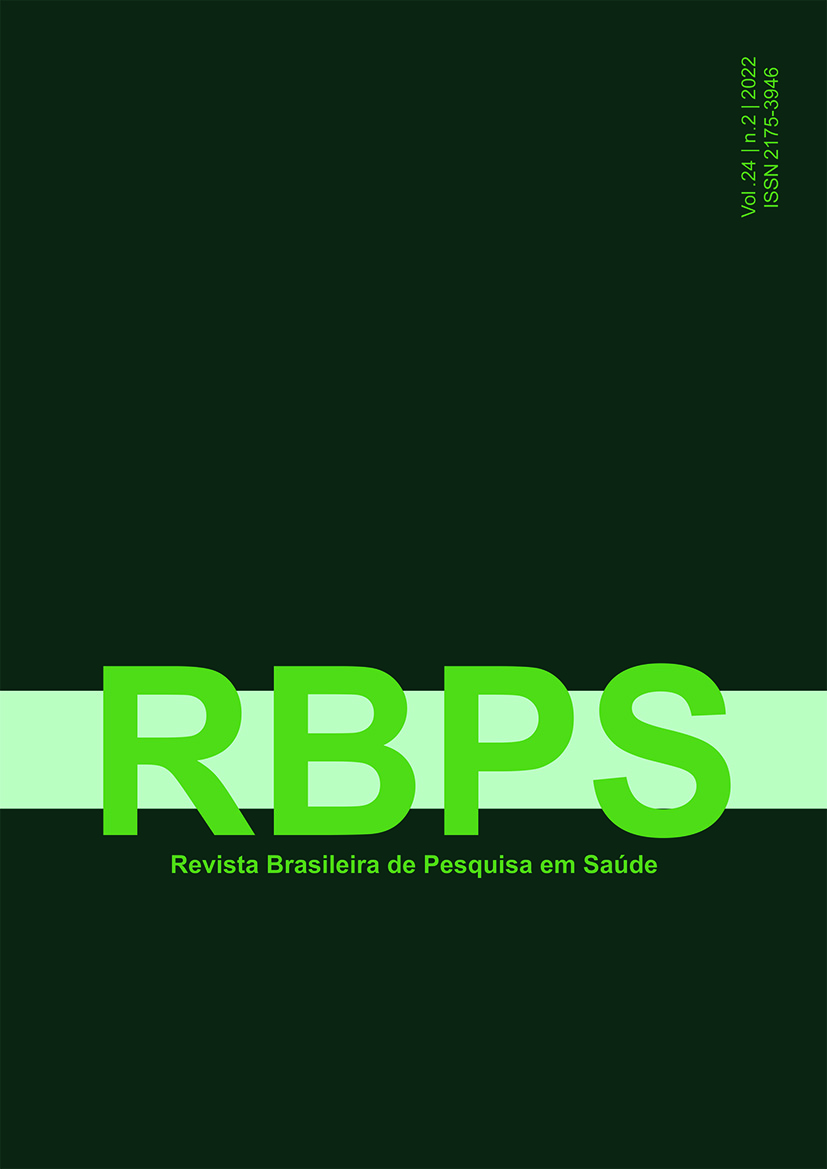Atuação do projeto de extensão artistas do cuidar: relato de experiência
DOI:
https://doi.org/10.47456/rbps.v24i2.34977Palavras-chave:
Enfermagem, Humanização da Assistência, Hospitalização, Terapia pela ArteResumo
Introdução: O ambiente hospitalar consiste em um espaço de cura e reabilitação, entretanto, está diretamente associado ao estigma da dor e sofrimento ocasionado pela internação. Assim, a terapia com palhaços pode contribuir para amenizar a tensão existente nesse cenário. Objetivo: Relatar a atuação do projeto de extensão Artistas do Cuidar: Arte, Riso e Olhar. Métodos: Relato de experiência, de carácter descritivo que aborda os principais aspectos da atuação do projeto de extensão Artistas do Cuidar. O projeto existe desde 2007, na Universidade Regional do Cariri, Unidade Descentralizada de Iguatu, e conta com a participação de 27 membros. Resultados: Os membros do projeto utilizam as características do palhaço para desenvolver ações no ambiente hospitalar, utilizando estratégias que variam dependendo de cada paciente, situação clínica e acompanhante. Ainda, realizam participações em eventos que ocorrem em forma de acolhidas e/ou peças teatrais. Mesmo diante de desafios e percalços, o projeto permanece com a sua atuação, com o seu intuito de promover a alegria através do riso e do lúdico para melhorar as ações de cuidado à saúde na área da enfermagem e amenizar a vivência da hospitalização. Assim, destaca-se a sensibilização que o projeto proporciona ao estudante, trazendo uma nova perspectiva para sua formação. Conclusão: O projeto influencia de forma positiva no que se refere ao bem-estar dos pacientes internados na unidade hospitalar, assim como, dos membros da equipe de enfermagem. Ainda, atinge positivamente os estudantes e o público que tem a oportunidade de assistir às suas apresentações.
Downloads
Referências
Cruz DD. A inserção do palhaço no ambiente hospitalar: experiências de um projeto de extensão. Rev. em Extensão [internet]. jul. 2016 [Acesso em: 4 dez. 2020];15(1):133- 40. Disponível em: https://doi.org/10.14393/REE.
Melo VS. Ludicidade e humanização da assistência em saúde: experiências do Projeto Resgatar. Rev. Portal: Saúde e Socied. [internet]. 2020 [Acesso em: 5 jun. 2020];5(2):1477-84. Disponível em: https://doi. org/10.28998/rpss.v5i2.10063.
Rossi I, Batigália F, Júnior R. Palhaçoterapia: alteração do perfil álgico e emocional de pacientes geriátricos hospitalizados. Arq. Ciênc. Saúde [internet]. 2016 [Acesso em: 5 jun. 2020];23(3):17-21. Disponível em: https://doi. org/10.17696/2318-3691.23.3.2016.415.
Sommerhalder A, Lino AM, Nicolielo ME. Voluntariado e humanização com palhaços: por quê? Para quê? Intervenções em crianças hospitalizadas. CONJECTURA: filos. e edu. [internet]. 2019 [Acesso em: 5 jun. 2020];24: p.019028. Disponível em: https://doi.org/10.18226/21784612.V24. E019028.
Catapan SC, Oliveira WF, Rotta TM. Palhaçoterapia em ambiente hospitalar: uma revisão de literatura. Ciênc. Saúde Coletiva [internet]. set. 2019 [Acesso em: 4 dez. 2020];24(9):3417-29. Disponível em: https://doi. org/10.1590/1413-81232018249.22832017.
Amorim KP, Bedaque HP. A Percepção dos estudantes de Medicina sobre a influência do Mediarte na educação médica. Rev. Brasil. Edu. Médica, 2018;42(2), 54-62.
Serrato VS, Souza PB, Silva KV, Pedroso G, Siqueira EN, Kronbauer GA. O corpo e a experiência de ser palhaço no contexto hospitalar. Anais da III SIEPE - Semana de Integração Ensino, Pesquisa e Extensão. 24 a 26 de setembro de 2013, UNICENTRO, Guarapuava - PR, ISSN - 2236- 7098.
Wayhs GD, Sei MB. A formação do profissional da saúde e o “ser palhaço” como recurso humanizador. Arch Health Invest. 2016. 7 Sim Saúde - Simpósio em Saúde 2016.
Bolorino N, Reghin JR, Prezotto KH, Botolato-Major, C. Percepção dos alunos da disciplina ludicoterapia sobre o cuidado lúdico: uma pesquisa-ação. Res., Soc. and Develop, 2020;9(12):e28191211038-e28191211038.
Freitas AN, André LFS, Roniele RS, Clarice FO, Alessandra MP, Braulio NO. A prática da terapia do riso na atenção hospitalar: reflexões a partir da vivência interdisciplinar. Rev. Polít. Públicas, 2013;12(1),54-8.
Nobrega JN, Nascimento JW, Brito MA; Miranda LS; Araújo MZ. Educação e saúde: crianças hospitalizadas são beneficiadas com a risoterapia. Congresso Nacional de Práticas Educativas; 28 a 30 de setembro de 2017. Campina Grande: COPRECIS, 2017.
Brito CM, Silveira R, Mendonça DB, Joaquim RH. O humor e o riso na promoção de saúde: uma experiência de inserção do palhaço na estratégia de saúde da família. Ciênc. Saúde Colet [internet]. fev. 2016. [Acesso em: 12 out. 2020];21(2):553-62. Disponível em: https://doi. org/10.1590/1413-81232015212.00982015.
Lemos AC. A utilização da risoterapia na assistência de enfermagem ao idoso institucionalizado [internet]. Rio de Janeiro: Universidade Federal do Estado do Rio de Janeiro; 2015 [Acesso em: 4 dez. 2020]. Disponível em: encurtador. com.br/kwT03.
Castro EM, Aguiar RS. Risoterapia: rir é o melhor remédio? Brazilian Journal of Health Review [internet]. 2019 [Acesso em: 4 dez. 2020];3(1):785-96. Disponível em: https://doi.org/10.34119/bjhrv3n1-062.
Downloads
Publicado
Edição
Seção
Licença
Copyright (c) 2022 Revista Brasileira de Pesquisa em Saúde

Este trabalho está licenciado sob uma licença Creative Commons Attribution-NonCommercial-NoDerivatives 4.0 International License.
A Revista Brasileira de Pesquisa em Saúde (RBPS) adota a licença CC-BY-NC 4.0, o que significa que os autores mantêm os direitos autorais de seus trabalhos submetidos à revista. Os autores são responsáveis por declarar que sua contribuição é um manuscrito original, que não foi publicado anteriormente e que não está em processo de submissão em outra revista científica simultaneamente. Ao submeter o manuscrito, os autores concedem à RBPS o direito exclusivo de primeira publicação, que passará por revisão por pares.
Os autores têm autorização para firmar contratos adicionais para distribuição não exclusiva da versão publicada pela RBPS (por exemplo, em repositórios institucionais ou como capítulo de livro), desde que seja feito o devido reconhecimento de autoria e de publicação inicial pela RBPS. Além disso, os autores são incentivados a disponibilizar seu trabalho online (por exemplo, em repositórios institucionais ou em suas páginas pessoais) após a publicação inicial na revista, com a devida citação de autoria e da publicação original pela RBPS.
Assim, de acordo com a licença CC-BY-NC 4.0, os leitores têm o direito de:
- Compartilhar — copiar e redistribuir o material em qualquer suporte ou formato;
- Adaptar — remixar, transformar, e criar a partir do material.
O licenciante não pode revogar estes direitos desde que você respeite os termos da licença. De acordo com os termos seguintes:
- Atribuição — Você deve dar o crédito apropriado, prover um link para a licença e indicar se mudanças foram feitas. Você deve fazê-lo em qualquer circunstância razoável, mas de maneira alguma que sugira ao licenciante a apoiar você ou o seu uso.
- Não Comercial — Você não pode usar o material para fins comerciais.
- Sem restrições adicionais — Você não pode aplicar termos jurídicos ou medidas de caráter tecnológico que restrinjam legalmente outros de fazerem algo que a licença permita.

























